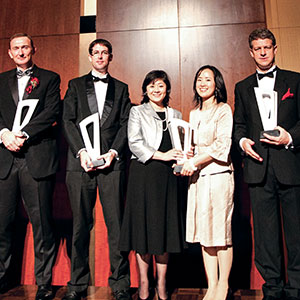Comparing notes on surviving heart conditions while 6,000 miles apart
In the sultry autumn of 2010, I lay close to death in the cardiac intensive care unit of a Tokyo hospital. Around me, an array of equipment that looked remarkably similar to the flight deck of the Starship Enterprise breathed on my behalf and monitored my vital signs: heartbeat, blood pressure, temperature and oxygen intake.
Intravenous drips administered vital dosages, chest tubes drained away blood, while a catheter removed other body fluids. A bevy of young, dedicated nurses observed the monitors and a team of equally dedicated surgeons performed regular interventions. I was, of course, aware of none of this; those closest to me had the harder time.
Only one day before I had walked into the hospital expecting a routine check-up, prompted by an odd moment of breathlessness when climbing the stairs at Omotesando station. I’d had no pain, and none of the other classic signs of a heart attack. Didn’t I have a healthy lifestyle? I had never been a smoker, hadn’t eaten red meat for 30 years, meditated daily and was fairly good about exercise.
The conditions of the health insurance policy that my employer provided stipulated annual health checks. Only months before, I’d completed a check with nothing unusual to report beyond slightly elevated blood pressure. If I had been busier, I might have skipped the hospital visit. I shudder now to think of the consequences.
The check-up initially consisted of blood work and an ECG, after which the consultant cardiologist decided an angiogram was required. In this procedure, a fine camera-catheter is inserted into the arteries through the groin or (as in my case) the wrist, and is passed through to the heart to determine whether there are any blockages. If any are found, a small balloon is inflated to widen the artery and a spring-like device called a stent can be inserted. It is a painless operation and can be followed on a monitor should a patient be so inclined.
The light banter between the cardiologist and the attending technician gradually ceased as the procedure continued. I could tell that the news was not good. My cardiac disease was too advanced for stents; quadruple bypass surgery was urgently needed.
In the end, five grafts had to be made; veins from both legs and the chest cavity were harvested to make them. The ironic consequence is that the worst scarring from the surgery is apparent today on my legs.
Complications meant that a second surgery had to be performed just hours after the first (and requiring that the heart be stopped by an injection of cold blood). Hence, the life-support system and the big question: would I be able to breathe for myself again and, if so, would there be brain damage?
Awareness slowly dawned. I felt impaled on a wheel of coloured lights, unable to move, looking down on my body. Bright points of light seemed to circle me. A nurse asked if I knew my date of birth. I remember laughing at what I thought was an absurd question. I knew the answer even though I could only think of it in Japanese—English failed me.
Moments later I was unable to tell my doctor how old I was in either language—even simple maths had never been my strong point.
Had I been more alert I could have simply cheated and looked at the white plastic strip around my left wrist. But in the post-anaesthesia confusion, other thoughts took hold: I desperately needed to go to the toilet but didn’t have money for the slot on the door. Where did that idea come from?
For several more days I drifted in and out of consciousness in the overheated ICU, masked and intubated, catheterised and cocooned. The days and nights merged so that I lost track of time entirely.
Friends have suggested that, had they faced the same situation, they would have gone back to the UK. However, I didn’t have the choice; time was not on my side. Yet I have no doubt that I received the finest attention.
It was of great comfort, too, that the hospital had no hesitation whatsoever in accepting my partner as my legal next of kin with all the attendant rights and responsibilities.
Ironically, just days after my release from hospital, my younger brother in Scotland suffered a heart attack and needed similar surgery. He was hospitalised and the surgery was postponed not once, but twice, despite his being fully prepped for surgery in each case. In addition, he was sent home after each postponement. It is hard to imagine the stress that this induced in him and his wife and children.
His condition was arguably more serious than mine (I had not, after all, suffered a heart attack; merely avoided one by the merest whisker) but he was not treated with the same urgency as I was. We have compared notes regarding aftercare, too, and, on balance, we agree I have the better deal here. I now have regular appointments with the senior consultant who performed the surgeries; I am seen on time and thoroughly checked to ensure that my recovery is on track. I am reminded, ever so gently, that while the surgery saved my life, I continue to live with cardiac disease and must adapt accordingly.
Some foreign residents have written critically of the Japanese healthcare system, maybe with good reason. And perhaps without a reasonable command of the Japanese language, my experience may have been different. But I cannot fault the Ikegami Sogo Byoin and the staff there who, without doubt, saved my life and who continue to provide aftercare in the friendliest and most professional manner.






